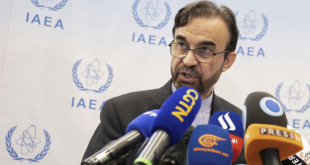Interpol rejected a request by Iran to drop arrest warrants against five leading Iranians, wanted by Argentina for their alleged role in a 1994 bombing that killed 85 people, Agence France-Presse (AFP) reported.
Â
Delegates at the world police body’s annual general assembly in Marrakech voted by a two-thirds majority to uphold a unanimous decision taken in March by Interpol’s executive committee to issue “red notices” against the five.Â
Â
Of the 146 member states attending the gathering, 78 voted to uphold Interpol’s earlier decision, 14 voted against it and 26 formally abstained.Â
Â
Among those subject to an arrest warrant is Iran’s former intelligence chief Ali Fallahian and the former head of the country’s Revolutionary Guards, Mohsen Rezaei, as well as three Iranian diplomats.Â
Â
“This shows that even after 13 years have passed, one can fight for justice with the tools that the law provides to fight terrorism,” Argentina’s chief prosecutor, Alberto Nisman, told reporters after the vote.Â
Â
The July 1994 bombing levelled the seven-floor Argentine Israeli Mutual Association building in Buenos Aires, a symbol of Argentina’s Jewish community which is the largest in Latin America.Â
Â
Argentinian prosecutors allege Iran masterminded the bombing in Buenos Aires and entrusted Lebanese militant group Hezbollah to execute it.Â
Â
Iran blames its enemies, the US and Israel, for trying to implicate it in the bombing.Â
Â
“Politics overruled the rule of justice. It was not a vote for justice, it was a political vote,” said the director of the international law department of Iran’s ministry of foreign affairs, Alireza Deihim.Â
Â
The decision comes at a time of rising tension between Iran and the West over its nuclear energy programme which the United States and the European Union suspect is part of a secret attempt to develop nuclear weapons.Â
Â
In a statement, Interpol president Jackie Selebi said the agency had treated both sides “fairly and impartially” and had “meticulously applied its rules throughout the dispute resolution process”.Â
Â
Argentina’s chief prosecutor also rejected any suggestion that the warrants were politically motivated and acknowledged that it was unlikely that Iran would extradite the suspects.Â
Â
“Irrespective of what Iran might wish to do, Argentina, and we hope that on this we will count on the support of all peace-loving nations that are fighting terrorism — will spare no effort to bring these people to justice,” said Nisman.Â
Â
In November 2006 Argentinian prosecutors issued arrest warrants against eight Iranians, including former president Akbar Hashemi Rafsanjani and former foreign minister Ali Akbar Velayati.Â
Â
But in March Interpol’s executive committee withdrew its warrants against three of them, including Rafsanjani and Velayati, but kept them in place for five others.Â
Â
“I am very happy because the authors of this attack should be tried, not because they have done something against Jews but because they did something against human beings,” the commander of the Israeli police’s special operations unit, Anat Granit, told AFP.Â
Â
The New York-based World Jewish Congress also welcomed the decision to uphold the arrest warrants.Â
Â
“This is a victory for the people of Argentina and for all those seeking to build a global community based on the rule of law and free from fear and intimidation,” its president Ronald Lauder said in a statement.Â
Â
Last year Interpol issued 2,804 “red notices” which informs its member countries that an arrest warrant has been issued by a judicial authority.Â
Â
Interpol has 186 member states but only those with delegates at the four-day annual conference which wraps up Thursday were allowed to vote.Â
 Eurasia Press & News
Eurasia Press & News


